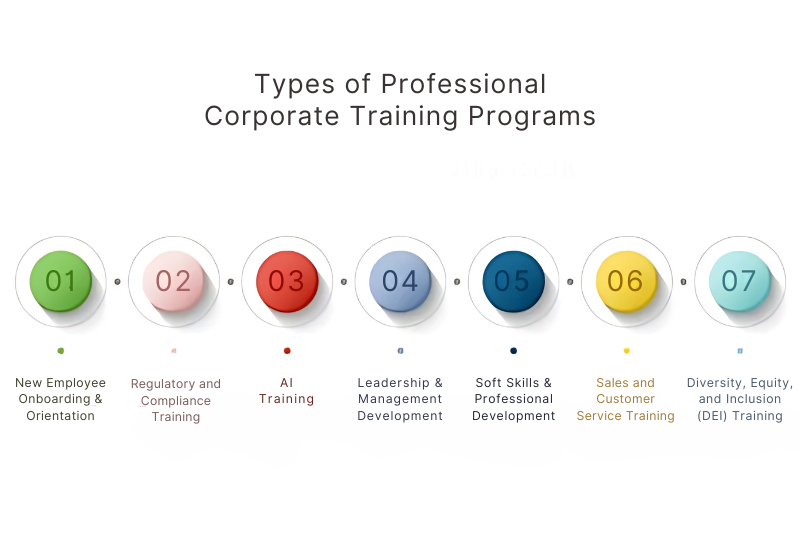Despite significant investments in corporate training, many programs fail to deliver real impact. Employees struggle to retain knowledge, businesses see little measurable improvement, and outdated training methods continue to miss the mark.
Research suggests that nearly 70% of employees forget what they learn within days, and only 12% apply their new skills on the job. The real challenge isn’t just offering training—it’s creating learning experiences that drive retention, engagement, and business success.
This article explores the key elements of an effective corporate training program, how companies can enhance workforce development, and why a strategic approach to upskilling is essential for long-term success for corporate companies.
What is Corporate Training?
Corporate training refers to structured learning programs that help employees improve their skills, knowledge, and overall performance. These programs bridge skill gaps, boost productivity, and align employees with company goals.
Corporate training can take various forms, including in-person workshops, online courses, mentorship programs, and hands-on learning experiences. As industries evolve and technology advances, businesses must ensure their workforce stays updated with the latest trends and best practices.
Investing in corporate training enhances employee capabilities and leads to higher engagement, increased efficiency, and long-term business success.
To maximise the effectiveness of corporate training, companies often implement specialised programs that cater to specific job roles and industry needs. This brings us to professional corporate training programs focusing on more targeted skill development.
What are Professional Corporate Training Programs?

Professional corporate training programs focus on equipping employees with specialised skills relevant to their roles. These programs go beyond general learning and emphasise industry-specific expertise, real-world application, and adaptability to evolving job demands.
Continuous learning has become essential with the constant shift in business and technology landscapes. Companies that provide well-structured training—whether through live sessions, self-paced courses, or interactive workshops—see significant improvements in employee performance and innovation.
Why is Corporate Training Essential?
Investing in corporate training is a strategic decision that yields numerous benefits, directly influencing organizational growth and competitiveness. Key advantages include:
- Enhanced Performance and Adaptability: Training equips employees with up-to-date skills, enabling them to adapt swiftly to industry changes and perform their roles more effectively.
- Prevention of Skill Gaps and Productivity Loss: Structured training programs address potential skill shortages, ensuring employees' competencies align with evolving job requirements, thereby maintaining high productivity levels.
- Alignment with Industry Standards: Regular training informs employees about current industry practices and standards, fostering innovation and ensuring the organization remains competitive.
- Improved Talent Retention: Offering career development opportunities through training demonstrates an organization's commitment to its employees, enhancing job satisfaction and reducing turnover rates.
A well-structured corporate training program is not a one-size-fits-all solution—it must cater to the unique needs of different employees and industries. Organisations offer various types of training programs to achieve this, each designed to enhance specific skills and competencies.
Types of Professional Corporate Training Programs

Corporate training programs come in various forms, each designed to address specific workforce needs. From onboarding new hires to developing leadership skills, these programs ensure employees stay competent, engaged, and aligned with business objectives. Below are key types of corporate training programs:
1. New Employee Onboarding & Orientation
A well-structured onboarding program familiarises new hires with company policies, work culture, and role expectations. This training ensures that employees integrate smoothly into the organisation and clearly understand their responsibilities from day one. A strong onboarding process can improve retention rates and employee engagement.
2. Regulatory and Compliance Training
This training focuses on legal, ethical, and industry-specific regulations that employees must follow. Compliance training minimises risks, ensures regulatory alignment, and prevents legal issues. Key areas include workplace safety, data protection, anti-harassment policies, and financial regulations.
3. AI Training
Incorporating AI training into employee development is essential to meet evolving industry demands. Such training equips employees with AI integration, data analysis, and strategic decision-making skills, fostering innovation and maintaining a competitive edge. Organizations like Corpoladder offer specialized courses, including leadership programs and hands-on technical training, to prepare teams for the AI-driven future.
4. Leadership & Management Development
Designed for employees transitioning into managerial roles, this training enhances decision-making, team management, and strategic thinking. Future leaders learn to motivate teams, resolve conflicts, and drive business success through effective leadership.
Also Read: The Leadership Advantage: Mastering the Art of Managing New Teams
5. Soft Skills & Professional Development
This program improves communication, teamwork, problem-solving, and emotional intelligence. Strong, soft skills lead to better workplace collaboration, enhanced customer relations, and overall productivity. Employees also develop skills like negotiation, adaptability, and time management.
6. Sales and Customer Service Training
Sales professionals and customer-facing employees benefit from training that sharpens negotiation, persuasion, and relationship-building skills. Effective customer service training enhances problem resolution, improves customer satisfaction, and strengthens brand loyalty.
7. Diversity, Equity, and Inclusion (DEI) Training
DEI training promotes a more inclusive and respectful workplace by educating employees on unconscious bias, cultural competence, and inclusive leadership. This training fosters a collaborative environment and improves team dynamics.
Effective training delivery is just as important as the content itself. Companies utilise different training methods to ensure accessibility, engagement, and knowledge retention.
Methods of Delivering Corporate Training
Organisations use different training methods to ensure employees effectively gain relevant skills. The choice of method depends on business needs, employee preferences, and the nature of the training content.
- Instructor-Led Classroom Training: Conducted in a physical setting, this traditional approach allows direct interaction between trainers and employees. It is ideal for hands-on learning, group discussions, and immediate feedback.
- Virtual and Online Training: Delivered through live webinars or self-paced modules. Online training offers flexibility for employees to learn from anywhere. It also caters to diverse learning styles through video lessons, interactive quizzes, and digital resources.
- Blended Learning Approach: This method combines in-person sessions and online modules, balancing flexibility with structured guidance. It allows employees to benefit from face-to-face mentoring while accessing digital content at their own pace.
Simply offering training programs isn’t enough—you must design them thoughtfully to maximise effectiveness. A strategic approach ensures that your employees receive relevant training, stay engaged, and can apply their new skills in real-world scenarios.
Designing Successful Corporate Training Programs

Designing a successful corporate training program requires a strategic approach that aligns with business objectives and employee needs. Companies can ensure effective skill development by identifying skill gaps, setting clear learning goals, and incorporating engaging methods. Leveraging technology further enhances accessibility, allowing employees to learn at their own pace while staying updated with industry advancements.
Top Technical Training Programs for Today's Workforce
As industries evolve, employees need up-to-date technical skills to stay competitive. Here are some of the most in-demand technical training programs:
- Data Analytics & Business Intelligence: Helps professionals interpret data, generate insights, and make data-driven decisions using tools/coding languages like Python, SQL, and Power BI.
- Cloud Computing & Cybersecurity: Cloud platforms (AWS, Azure, Google Cloud) and security practices are covered to protect digital infrastructure.
- Software Development & DevOps: Focuses on programming languages, software engineering principles, and DevOps methodologies to enhance efficiency in software deployment.
- AI & Machine Learning: Provides knowledge on AI frameworks, automation tools, and machine learning models for advanced problem-solving.
- Project Management & Agile Methodologies: Trains professionals in Agile, Scrum, and PMP frameworks to improve project execution and team collaboration.
While corporate training is invaluable, companies often face challenges in execution. From low engagement to keeping up with industry advancements, addressing these obstacles ensures that training remains effective and impactful.
Common Challenges in Corporate Training and Solutions
Corporate training programs often face hurdles that hinder their effectiveness. Employees may struggle with engagement and time constraints or find the training irrelevant to their roles. Addressing these challenges with the right solutions ensures corporate training delivers value and fosters long-term growth.
- Low Employee Engagement: Employees may perceive training as a mandatory task rather than a valuable learning opportunity, reducing participation and interest.
- Lack of Customization: Generic training programs might not address the specific needs of different job roles or align with industry requirements, resulting in a disconnect between training content and practical application.
- Time Constraints: Busy work schedules can make it difficult for employees to dedicate time to training, leading to lower completion rates and limited knowledge retention.
- Measuring Training Effectiveness: Organisations may struggle to determine whether training improves performance and skill development without proper assessment tools.
- Keeping Up with Industry Changes: Rapid technological advancements and evolving business practices can render training content outdated quickly, necessitating continuous updates to training materials.
Selecting the right training provider is essential for delivering high-impact programs. Corpoladder offers customised, expert-led corporate training solutions to align with industry trends and workforce requirements.
Choose the Right Corporate Training Program with Corpoladder
Corpoladder is a global training and upskilling company that helps your business equip employees with cutting-edge expertise. We design curated courses that stay updated with the latest innovations by partnering with industry leaders and domain experts.
Our diverse training solutions are tailored to meet your company's specific needs, ensuring that your workforce remains skilled, adaptable, and ready for the challenges of today’s dynamic business environment.
- Flexible Learning Formats: Offers in-person workshops, live online training, and self-paced courses to suit different learning preferences and work schedules.
- Customised Programs: Tailors training content based on industry demands, job roles, and skill levels for maximum impact.
- Expert-Led Training: Collaborates with experienced professionals and subject matter experts to ensure high-quality instruction.
- Comprehensive Skill Development: Covers technical proficiency, leadership growth, compliance training, and soft skills enhancement.
- Continuous Learning Support: This provides ongoing access to resources, assessments, and certifications to reinforce knowledge and skill application.
Conclusion
Corporate training programs equip employees with the skills needed to excel in their roles while driving overall business growth. Well-structured training enhances productivity, boosts employee engagement, and strengthens talent retention.
To stay ahead in a fast-changing industry landscape, businesses need training solutions that are not only effective but also adaptable to evolving challenges. That’s where Corpoladder comes in. With industry-aligned programs, expert-led training, and a customized approach, Corpoladder ensures your workforce gains the skills necessary for sustained success.
Maximise productivity with the right training! Let Corpoladder tailor a program to fit your business needs.






.webp)











